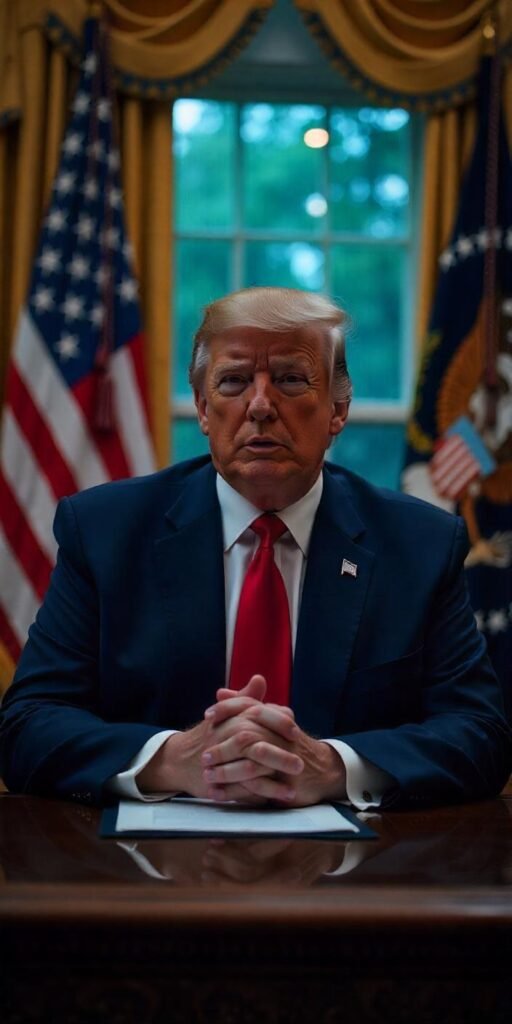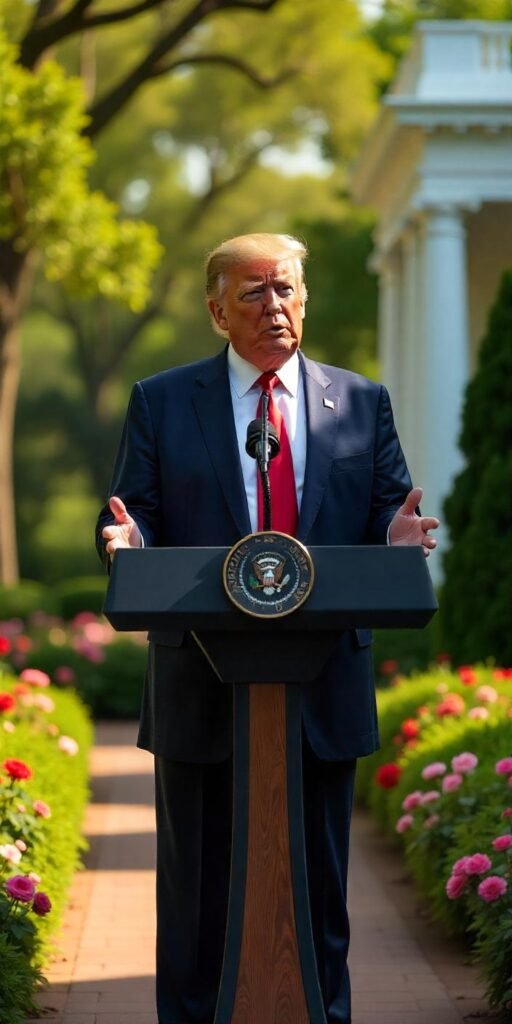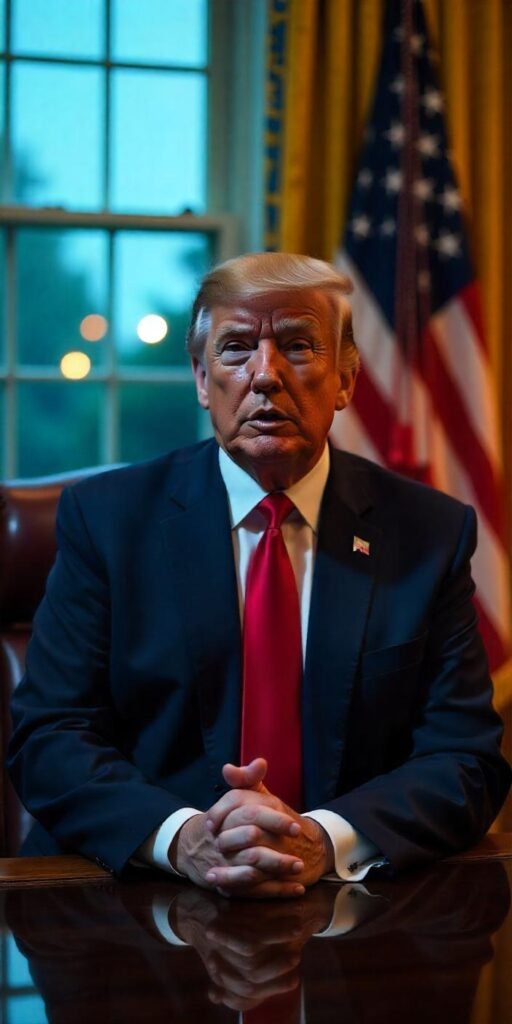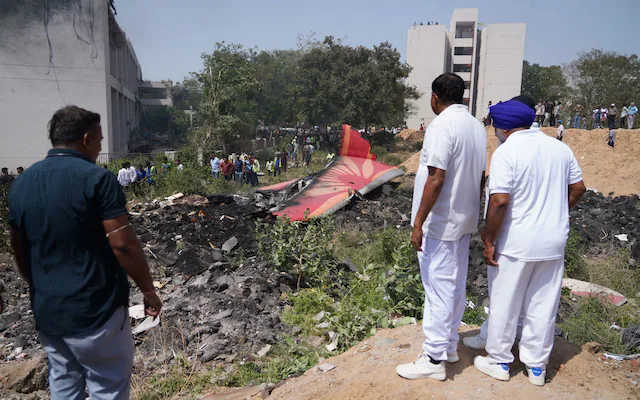
Trump threatens to bomb Iran if it rejects the nuclear deal.
Former US President Donald Trump warned Iran on Sunday that there might be severe repercussions, including possible military action or secondary tariffs, if Tehran is unable to come to a nuclear deal with Washington.
Trump acknowledged that U.S. and Iranian officials were having talks in an interview with NBC News, but he gave no other information. He said, “There will be bombing if they don’t make a deal.” But he also hinted that if Iran rejects a new agreement, secondary taxes, like those he imposed during his last term, would be applied.
Trump withdrew from the 2015 nuclear agreement, which lifted economic sanctions in exchange for stringent limitations on Iran’s nuclear program, during his presidency (2017–2021). After that, he reinstituted strict U.S. sanctions, which caused Iran to go beyond predetermined bounds with its uranium enrichment program.
Iran has so far resisted demands to engage in negotiations under threat of military force, even after Trump issued his warning. Regarding the potential for a new nuclear deal, Iranian Foreign Minister Abbas Araqchi said Thursday that Tehran had replied to a letter from Trump via Oman.
Persistent Nuclear Conflicts
Iran has long been accused by Western nations of enriching uranium above levels required for civilian energy usage, implying that the nation is covertly working to produce nuclear weapons. Iran maintains, however, that its nuclear program is only for the generation of civilian electricity.
Trump’s Alert Regarding Sanctions on Russian Oil
In a further threat to Russia, Trump said that if he thinks Moscow is impeding efforts to put an end to the conflict in Ukraine, he may apply secondary tariffs of 25% to 50% on all Russian oil. If no truce is struck, he said, these tariffs might be implemented in as little as one month.
Trump was irritated by Russian President Vladimir Putin’s recent remarks casting doubt on the legitimacy of Ukrainian President Volodymyr Zelensky’s administration during an interview with NBC News. Trump added that he will talk to Putin this week.
Trump has made ending the “ridiculous” war in Ukraine a top priority of his 2024 presidential campaign since he took office on January 20. He has, however, also come under fire for his divisive statements, which have included referring to Zelensky as a dictator and demanding fresh elections in Ukraine.
Putin proposed putting Ukraine under a provisional government on Friday in order to facilitate fresh elections and diplomatic pacts. Trump responded by threatening to impose secondary taxes on all Russian oil if he thinks Russia is to blame and we are unable to come to an agreement on a ceasefire in Ukraine.

He said, “If you buy oil from Russia, you won’t be able to do business in the U.S.” 25% to 50% tariffs might be imposed, and they would take effect within a month if no peace agreement is achieved.
Trump stated that although he and Putin have had disagreements in the past, they have maintained a “very good relationship” despite his tough stance, and that his ire toward the Russian leader will swiftly subside if the proper steps are followed.
Trump threatens to bomb Iran if it rejects the nuclear deal.
Donald Trump, the former president of the United States, has warned Iran that “there will be bombing” if Tehran rejects a new nuclear agreement with Washington. His comments, which he delivered in an interview with NBC News, came as worries about a possible military conflict in the Middle East are heightened by tensions over Iran’s nuclear program.
Trump’s Position on the Nuclear Deal with Iran
Trump has long been a critic of the 2015 Joint Comprehensive Plan of Action (JCPOA), also known as the Iran nuclear deal, which was negotiated under former President Barack Obama and sought to curb Iran’s nuclear activities in exchange for the lifting of economic sanctions. In 2018, Trump withdrew the United States from the agreement, calling it “the worst agreement ever made.” After the U.S. withdrew, Trump’s administration reimposed strict sanctions on Iran, crippling its economy and causing Tehran to resume uranium enrichment beyond the agreed-upon limits. This action increased tensions between the two countries, as there were concerns that Iran was getting closer to developing nuclear weapons, a claim the Iranian government denies and maintains its nuclear program is for peaceful uses.
A New Effort at Diplomacy or War?
Now, Trump is adopting a tough posture toward Iran once more, threatening to use force if Tehran does not engage in talks.
Trump told NBC News, “There will be bombing if they don’t make a deal.” He did, however, add that economic pressure might be a substitute tactic, stating that he might enact secondary tariffs akin to those he implemented when in office.
Iran has resisted outside pressure in spite of these warnings, declining to engage in negotiations while facing military threats. Iranian officials insist that the lifting of sanctions is a prerequisite for any negotiations to take place on their terms.
Middle East Uneasy: Local Responses
Both foreign observers and regional allies have responded to Trump’s remarks.
Israel, which has long opposed Iran’s nuclear aspirations, has praised Trump’s firm posture. Benjamin Netanyahu, the Israeli prime minister, has frequently urged more forceful measures against Iran and issued dire warnings about the dangers of a nuclear-armed Tehran.
Concerns about Iran’s nuclear program have also been voiced by Saudi Arabia and other Gulf nations, who see Iran as a regional rival. They have, meanwhile, expressed cautious optimism regarding fresh diplomatic initiatives.
France, Germany, and the United Kingdom are among the European nations that have called for a diplomatic solution, cautioning that military action could further destabilize the Middle East.

Iran’s Resolute Reaction
Trump‘s warning has been met with a defiant response from Iran. Iran “will not bow to threats” and is still dedicated to developing its nuclear program in accordance with international law, according to Ali Bagheri Kani, Iran’s chief nuclear negotiator.
Trump’s comments have also been rejected by Iran’s foreign minister, Hossein Amir-Abdollahian, who described them as “empty rhetoric” intended to apply political pressure. Iran is ready to defend itself against any military threats, he said.
What Comes Next?
Experts think the upcoming months may be critical in deciding whether the situation escalates into violence or progresses toward diplomatic resolution, with Trump’s comments adding to the uncertainty.
According to some commentators, Trump’s threat of military action may be a ploy to force Iran to engage in negotiations. Others caution that the likelihood of a military conflict between the United States and Iran could rise sharply if diplomacy fails.
In conclusion
Trump’s threat of “bombing” Iran has given the situation a new sense of urgency as tensions over its nuclear program continue to rise. One thing is certain: the scenario has the capacity to alter Middle Eastern geopolitics and have an effect on international stability, regardless of whether Iran decides to engage in negotiations or to hold its ground.











Leave a Reply